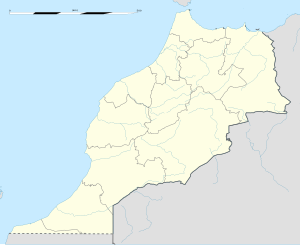Ksar el-Kebir
|
El-Ksar-el-Kebir القصر الكبير ⵍⵇⵚⵔ ⵍⴽⴱⵉⵔ |
||
|---|---|---|
|
||
| Location in Morocco | ||
| Coordinates: 34°59′56″N 5°54′10″W / 34.99889°N 5.90278°W | ||
| Country |
|
|
| Region | Tanger-Tetouan-Al Hoceima | |
| Time zone | WET (UTC+0) | |
| • Summer (DST) | WEST (UTC+1) | |
El-Ksar el Kebir (Arabic: القصر الكبير; Berber: ⵍⵇⵚⵔ ⵍⴽⴱⵉⵔ) is a city in northwest of Morocco with 110,000 inhabitants, about 160 km from Rabat, 32 km from Larache and 110 km from Tangier.
The city is also known as Alcazarquivir in Spanish or Alcácer-Quibir in Portuguese. The name means "the big castle". The city is located nearby the Loukous river that makes El-Ksar-el-Kebir one of Morocco's richest agricultural regions. El-Ksar el-Kebir provides almost 20% of the needed sugar of Morocco. Neighbouring cities and towns include Larache, Chefchaouen, Arbawa and Tateft.
Recently, the city was developed in many directions with the upcoming of the new party at the municipality "al-adala wa-t-tanmiya", they have worked on improving the infrastructure of the old Medina.
1st millennium BCE: Established as a Carthaginian colony; after the Punic Wars it came under Roman control with the name Oppidum Novum.
In 1578, King Sebastian of Portugal suffered a crushing defeat in the Battle of Alcácer Quibir at the hands of the King Abd al-Malik of Morocco, which ended Portugal's ambitions to invade and Christianize the Maghreb. Both kings died during the battle, as did Abdallah Mohammed, who was allied with Sebastian. The death of King Sebastian started the events which led to the temporary union of the crowns of Portugal and Spain under Philip II of Spain. King Abd al-Malik's victory gave Morocco substantial strength and international prestige.
The city experienced a substantial growth with the settling of an important Spanish garrison in 1911 as a part of the Spanish Morocco Protectorate in Morocco. After Morocco's independence and the building of the Oued el Makhazine reservoir by King Hassan II to manage the Loukkos' river regime, the city became an important regional agricultural distribution center.
...
Wikipedia


